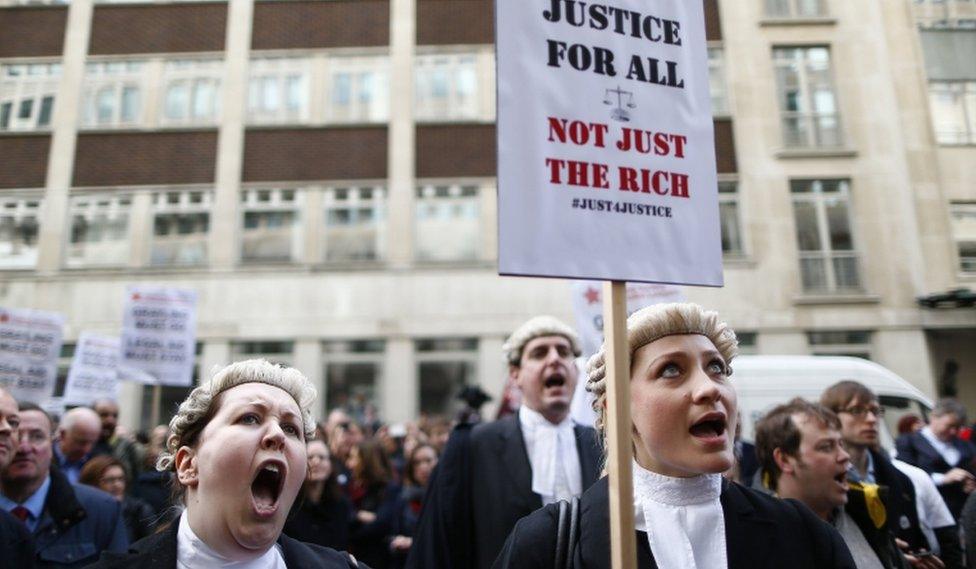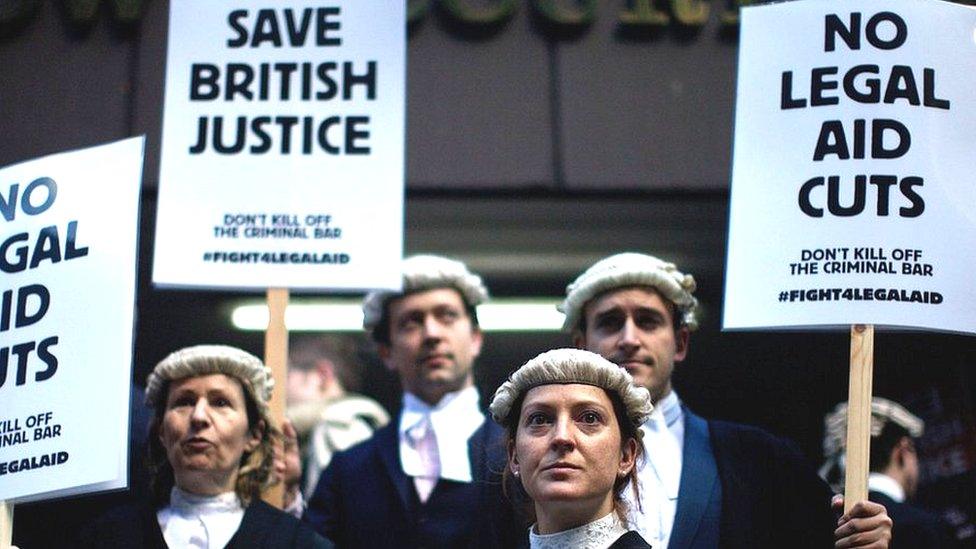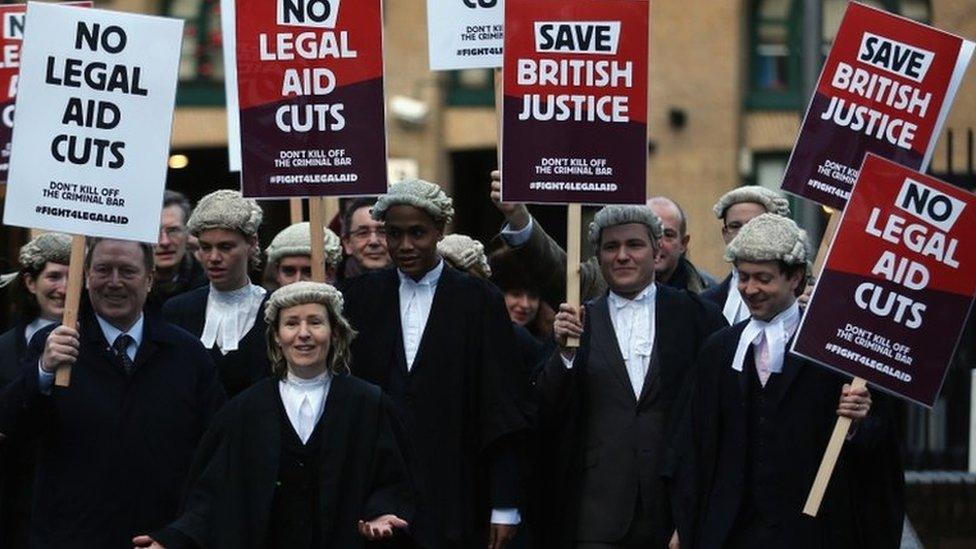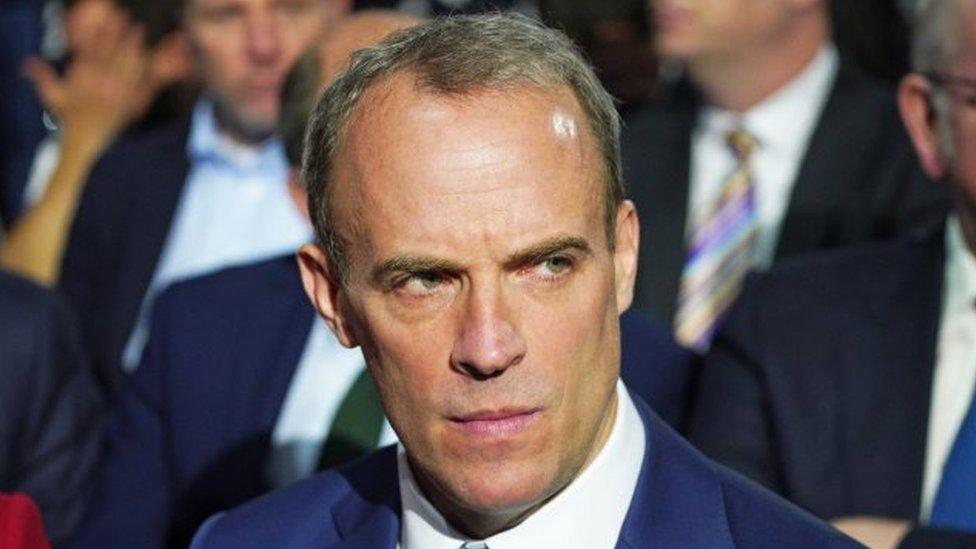Criminal barristers vote to strike over pay rates
- Published

Barristers last walked out over Legal Aid in 2014
Criminal barristers have voted to strike in an escalating dispute with the government over funding for trials.
The vote by defence barristers is likely to cause chaos in the criminal courts in England and Wales.
Eight out of 10 barristers voted for the walkouts amid concerns the government will not improve a proposed increase in criminal Legal Aid.
The Legal Aid system is at the heart of justice - ensuring that all defendants get proper and fair representation.
An independent review of the future of the system, ordered by the government, told ministers they needed to increase funding by at least 15% to prevent a major crisis in criminal justice. Barristers say much more is needed to stop an exodus from criminal law to other branches of the profession.
Over the last decade the number of lawyers working in criminal justice - both barristers who appear before judges in court and solicitors who instruct them - has declined, as many say they cannot make a living anymore.
That loss of criminal barristers is reflected in the current court backlogs which show that many prosecutions are being delayed because of a shortage of representatives to make sure hearings can go ahead.
Announcing the strike, the Criminal Bar Association said of the 2,055 of its members who had voted, 80% had backed court walkouts from Monday 27 June.
In practice, that means that defence barristers will refuse to work - including taking on new cases - meaning judges will be forced to delay hearings and put back trials.
Under the plan, the number of days that defence barristers will refuse to work will increase week-on-week until a pause at the end of July - and then a resumption of the action on the same pattern.
Two young lawyers share their concerns about the profession
In a joint statement, Jo Sidhu QC and Kirsty Brimelow QC, chair and vice chair respectively of the association, said the "extraordinary" result "reflects a recognition amongst criminal barristers at all levels that what is at stake is the survival of a profession of specialist criminal advocates and of the criminal justice system".
"Without immediate action to halt the exodus of criminal barristers from our ranks, the record backlog that has crippled our courts will continue to inflict misery upon victims and defendants alike, and the public will be betrayed," they added.
Courts Minister James Cartlidge said the result was "disappointing" and the proposed action did not represent a majority of those who had voted. Under the association's ballot, more than 80% backed some form of strike action. The greatest level of support, 43%, was for strikes plus a refusal to take on new Legal Aid work.
"The 15% pay increase we consulted on would mean a typical criminal barrister earning around £7,000 extra per year and only last week I confirmed we are moving as quickly as possible to introduce fee rises by the end of September," said the minister.
"We encourage the Criminal Bar Association to work with us, rather than escalate to unnecessary strike action, as it will only serve to harm victims as they are forced to wait longer for justice."

How much do criminal lawyers earn?
The Legal Aid rules set limits on fees
For 13 hours, a solicitor would earn around £250 - an hourly rate of almost £20
When it comes to court, some barristers say the time they spend preparing cases means their hourly earnings are below minimum wage
The Law Society has mapped the loss of criminal solicitors, external nationwide
In comparison, the website Checkatrade says the average day rate, external of a plumber is now almost £350 - although there are obviously regional differences
Lawyers who work in other areas, such as private corporate law, can expect to earn £100,000 a year from very early in their careers.

Next Monday will see barristers rally at a number of high-profile courts that manage the most important cases in the country - including the Old Bailey, Birmingham, Manchester and Bristol Crown Courts.
Across England and Wales, efforts by the government to reduce court case backlogs from a historic high - caused partly by the pandemic and partly by preceding cuts - have moved slowly.
The latest figures, up to April 2022, show there were 358,076 outstanding cases at magistrates' courts and 58,271 at crown courts.
However, delays vary hugely depending on the crime - with victims of rape and other serious sexual offences waiting the longest for prosecutions to be completed.
Your device may not support this visualisation
Related topics
- Published11 April 2022

- Published16 February 2022

- Published14 October 2021
